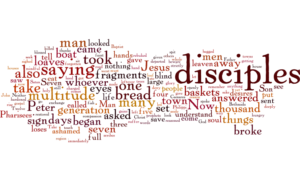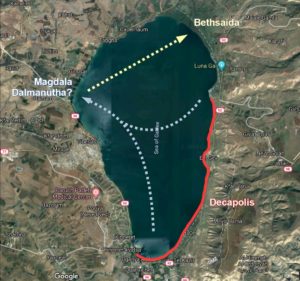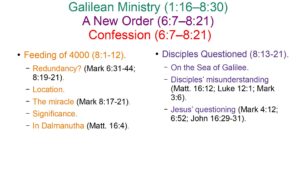The Ministry of Jesus in Galilee
Mark 1:16–8:30
A New King (1:16–3:6).
Kingdom is Near (1:15)
Popularity (1:16-45).
Conflict (2:1—3:6).
Jewish Leaders Reject Him (3:6)
A New Kingdom (3:7—6:6)
Kingdom Has Small Beginnings (4:3)
Continued Conflict (3:7-35).
Parables (4:1-34).
Identity (4:36—6:6).
Jesus’ Town Rejects Him (6:6)
A New Order (6:7—8:21)
Beware of Herod & Pharisees (8:15)
Confession (6:7—8:21).
Limited Commission (6:7-13).
John the Baptist Executed (6:14-29).
Five Thousand Fed (6:30-44).
Jesus Walks on Water (6:45-56).
Opposing Pharisaic Traditions (7:1-23).
Syro-Phoenician Woman (7:24-30).
Deaf Man Healed (7:31-37).
Disciples Questioned (8:13-21).
Location—they are heading from Dalmanutha (Magdala?) to Bethsaida by boat.
Disciples’ misunderstanding.
Even with the seven large baskets that were left over, they forget to bring some bread on their journey.
They could have eaten it all or given it all away, or perhaps it even spoiled.
Jesus takes this opportunity to warn His disciples about the “leaven of the Pharisees and the leaven of Herod.”
Mark doesn’t explain what Jesus is talking about here specifically, but Matthew relates this to the doctrine of the Pharisees and the Sadducees (Matt. 16:12).
Luke’s similar account refers to the hypocrisy of the Pharisees (Luke 12:1).
Certainly their doctrine is something to be wary of—it’s something Jesus has been teaching against for some time, and will continue to teach against.
Their hypocrisy is also evident in 8:11-12 in their desire to see another sign, knowing that one more won’t convince them.
At the same time, the Pharisees had the religious power while the Herodians had the political power and it would not last much longer because of Jesus.
The Pharisees had shown their own spiritual blindness and the disciples were about to reveal their own spiritual blindness.
They thought Jesus was commenting on the fact that they had no bread. But if that were the case, what did they think Jesus was really warning them of?
The Pharisees were already plotting with the Herodians to kill Jesus (3:6).
Perhaps Jesus was warning them not to purchase bread from those groups because of their plotting together?
But Jesus chides them for their lack of understanding.
Jesus is frustrated that they, the people closest to Him, still just don’t get it.
This all leads up to the climax of this section of Mark, the great confession (8:29), but the disciples just aren’t there yet.
After all they had witnessed, all they had experienced, they were still clueless.
They had seen Him cast out demons, heal the sick, restore sight to the blind, open the ears of the deaf, raise people from the dead, walk on the water, and calm a storm. Even the disciples cast out demons and healed the sick, and yet they still didn’t see!
This calls to mind what Jesus told them while speaking in parables (Mark 4:12) – they see but do not perceive, they hear but do not understand.
We are also reminded of what happened after Jesus walked on water, that their hearts were hardened (Mark 6:52).
John writes that all the Eleven didn’t fully believe until just before His betrayal in the Garden of Gethsemane, after He spoke plainly to them (John 16:29-31).
After all they had seen and done, why would Jesus choose these two miracles as the examples that should have made His identity obvious to them? It could be as simple as this: because they lamented not having enough bread. He, of course, had the power to multiply that one loaf so they would have enough!
It should also call to mind the manna from heaven given to the Israelites in the wilderness, helping them to see He was the Prophet like Moses, the Messiah prophesied to come, the Son of God.
Not only that, but He also served the Jews along with the Gentiles!
They could recall the facts of the miracles, but not their significance.
At least one of these miracles (feeding 5000) was so important it had to be in all four gospel accounts—the only one in fact!
Some things are best learned when we figure them out for ourselves, and this was one of those things.
When we teach the gospel to someone, it’s often best for them to study with an open Bible to see the truth for themselves. They come to the right conclusions when the right questions are asked.
Jesus is doing that here for His disciples, not explaining what they should’ve gotten by now.
Instead, He’s getting them thinking about that question so they can put the pieces together when He asks them in earnest in Caesarea Philippi.
Do you think you would’ve understood what the disciples did not by this point? Probably not! We have both hindsight and Mark’s commentary on these events, not to mention the other gospel writers and the rest of the N.T.
Disciples Don’t See (8:18)


